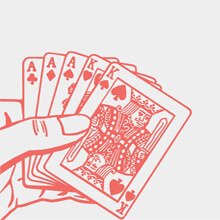
Poker Maths
- To play poker for profit, and understanding of the maths is needed
- With some practice, calculating poker odds becomes second nature
- Long-term poker maths will give you an advantage over other players
An understanding of poker maths is an important part of playing poker profitably. Many players who do not understand even the basics of poker maths are simply giving their money away. This article will outline the simple and important concepts you need to know to ensure your play is profitable.
There are several areas of poker maths that will be covered in this article. The first is the concept of ‘expectation’ which determines your poker profits over time. Next we will look at pot-odds and outs, the most basic form of poker maths. Finally some more advanced math concepts will be mentioned involving implied-odds.
Expectation in its simplest form involves assessing whether a certain poker play would make money if it was repeated 100’s of times. Because of the random element of cards dealt in poker, an individual hand is subject to chance factors. However a player who regularly gets money into the pot with the best hand will win over time, that is to say that this player has a positive expectation.
Understanding expectation is the cornerstone of poker maths. However good you are at poker, if you go against the odds by taking ‘negative expectation’ bets you will inevitably lose money over time. Conversely, if you ensure your poker maths knowledge lets you take positive expectation bets then you will win, regardless of the outcome of any single hand.
The ‘must have’ poker maths knowledge concerns pot-odds and outs. Pot-odds are calculated by simply dividing the amount you have to call by the total amount in the pot. For example, if the total pot including your opponent’s bet was $100 and you needed to call $20, then the pot odds are 5-to-1.
If you have a hand such as four cards to a straight or flush and need to improve on the turn or river to win, then you also need to know your chances of improving. Put simply, if you call a bet when your chances of improving are less than the odds being offered by the pot then you will lose over time, whether or not you make your flush this time.
Calculating outs is easy. You simply divide the number of cards that will make your hand by the number of ‘unseen’ cards in the deck. For example, after the flop you have four cards to a flush. You have seen five of the original 52 cards and know that four are spades. Thus nine of the unseen 47 cards will make your flush on the turn and 38 will not. Your chances of improving are approximately 4.2-to-1. If you were offered pot-odds of 5-to-1 on this event, then calling would win you money in the long run.

Taking Poker Maths Further
Taking simple poker maths one step further it is easy to see how your odds can actually be better than they seem. If you make your flush or straight you might well win a number of extra bets from your opponent on later betting rounds. These bets are known as your ‘implied-odds’, that is the implied extra profit after making your hand. Be careful with this concept until you build some experience at the tables, as different opponents and different situations lead to markedly different implied-odds being available.
To summarise, poker maths is an important skill for all players to learn. Without a basic understanding of odds and outs you will not be able to ensure that you take ‘positive expectation’ bets. Taking positive expectation bets (and avoiding negative expectation bets) will make you money in poker over time. The key poker mathematics to understand in order to do this are pot-odds and the number of ‘outs’ which make your hand. As you gain experience you will be able to include ‘implied odds’ into these calculations.